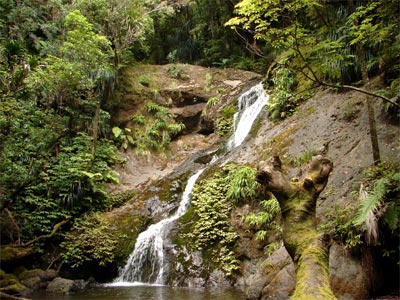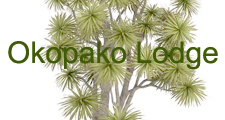The Farm (and its History)

Waterfall on Okopako farm
The name of the farm, Okopako, means ‘the place where you hear the sound of the running water’, and is the name of one of the streams that runs through the farm.
Okopako (the farm) has been in the King family for about 110 years since Horace King (grandfather of current owner Nils) purchased the property in circa 1910. Horace and his family cleared the land and milled timber using a steam powered sawmill. (The mill was used until the early 1950s.) From 1920 to 1970 the sons and their families had a small herd of 20-30 dairy cows, which they milked by hand. One son, Gordon (aka Monty), kept bullock teams of 6 pairs for hauling out the logs.
Nils and Lois King have lived on the farm since early 1981. Kristina McGuiness-King returned to the Hokianga in 2019, and Charlie Leuenberger moved here in 2022. The King family established Okopako Pony Trekking in 1985, and this business ran until 2007. Okopako Lodge opened in December 1993 and is situated on the 131-hectare farm about 150 metres above sea-level. Over half of the farm (about 90 hectares) is in native kauri forest, where you can find large Kauri, Rimu, and Tanekaha amongst the regrowth bush.
The Gardens
Our organic vegetable garden is planted up in spring weather permitting with potato, sweetcorn, tomato, cucumber, pumpkin, lettuce, beetroot, carrots, radishes, onions, zucchini and runner beans. Herbs such sweet basil, rocket, marigolds and coriander are used as ‘companions plants’. Some years we plant a wildflowers section to attract bees, butterflies and other beneficial insects.
For the winter garden we plant in autumn, cauliflower, broccoli, kale, silver beet beetroot, garlic, onions and shallots.
We mulch heavily in the spring and summer with animal manure and lawn clippings to retain soil moisture and prevent weeds from growing.
The Worm Farms’ are in large containers which have good drainage holes in the base. We layer food scraps, animal manure, cardboard, dolomite and some of the ‘bokashi bucket’ compost into these containers. The Tiger Worms break this all down into a black mass which we can dig into the vegetable gardens. The black liquid which drains out is diluted and watered onto plants as fertiliser.
Surrounding the old farm house and Lodge we have a wide variety of fruit trees, including apple, pear, plum, cherry guava, feijoa, lemon, grapefruit, mandarin, persimmon, fig trees, and a very old grape vine planted by the early settlers here. They are fed with animal manure, compost, dolomite, wood ash, sea weed, gypsum and are heavily mulched in summer to retain soil moisture.
Kristina and Charlie are also establishing a number of rose gardens and fencelines of roses and wildflowers around the Lodge and property, as well as extensive vegetable gardens and orchard areas on their part of the farm (across the road from the Lodge area).
No artificial fertilisers are used on the gardens or fruit trees. In addition to the worm farm by products, we make liquid fertilisers using, sea weed, sheep manure and comfrey leaves.
Working on the Farm?
We sometimes host tourists who want to experience life on the farm. You must be prepared to assist in the Lodge, help with meal preparation, dishes and other household chores, work in the flower or organic vegetable gardens, help with landscaping, building, cleaning up the paddocks, and general farm work, etc. If you are interested in working on the farm, in the gardens and in the Lodge, please contact us on info@okopako.co.nz.
Read an article about the farm and family that featured in the July 2017 issue of Northern Farming Lifestyles (pages 6-7).

